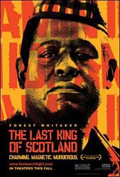[This article was originally published in The Jamaica Sunday Observer. This online version has been slightly amended from the original article.]
One of Africa’s bloodiest periods in history makes the Big Screen
 ‘Charming. Magnetic. Murderous.’ This is the tag line of the recent release by Fox Searchlight Pictures; three words that succinctly describe the subject of this feature presentation: the late General Idi Amin. Based on the eponymous novel by Giles Fodden and firmly grounded in real facts and events, The Last King of Scotland – despite its disingenuous title – is a superbly crafted, harrowing portrayal of one of Africa’s most tyrannical dictators.
‘Charming. Magnetic. Murderous.’ This is the tag line of the recent release by Fox Searchlight Pictures; three words that succinctly describe the subject of this feature presentation: the late General Idi Amin. Based on the eponymous novel by Giles Fodden and firmly grounded in real facts and events, The Last King of Scotland – despite its disingenuous title – is a superbly crafted, harrowing portrayal of one of Africa’s most tyrannical dictators.
Interestingly, we see the film through the eyes of a fictional character: a fresh-out-of-school Scottish doctor, Nicholas Garriger (James McAvoy), who impulsively decides to embark for Uganda to escape the pressures of his father. Garriger arrives on the very day that General Amin (Forest Whitaker) ousts the former President, Milton Obote, in a military coup, and he experiences firsthand the euphoria of a country celebrating the downfall of a past dictator. Vibrant colours and fast edits highlight the animated ambience as we discover all the delights of a new exotic country alongside the protagonist. However, the young Scot soon finds himself being unwittingly drawn into the bosom of African politics when he accepts the post of the General’s personal physician.
As a visitor and a rather naïve but likeable character, Garriger is the perfect vehicle through which the viewer is meticulously sewn into the narrative. As the young Scotsman is amused by the General’s geniality, impressed by his rhetoric and charmed by his generosity, so we are amused, impressed and charmed by Amin. But as Garriger begins to grow increasingly aware of the realities that surround him, the tone of the film begins to metamorphose. The lighting becomes gritty; the atmosphere turns tense and foreboding. The naïve Scotsman suddenly finds himself trapped in a perilous position as he realises that he is a close associate of a merciless megalomaniac.
The closing section of the film is not for the faint-hearted – it is filled with graphic scenes of bodily disfiguration and brutal violence. However it is a suitably terror-inducing climax for a horrendous period in history. It has been recorded that during his reign from 1971-79, General Idi Amin ordered the killing of 300,000 Ugandans.
Gripping. Titillating. Terrifying. This is how I would summarise the first filmic effort by documentary-director Kevin McDonald (Touching the Void). The cinematography is superb, the acting exemplary (you would have to search far and wide to find a more captivating performance than Whitaker’s), and the film is strongly set to take a top ranking position amidst political classics, alongside films such as Malcolm X and Hotel Rwanda.